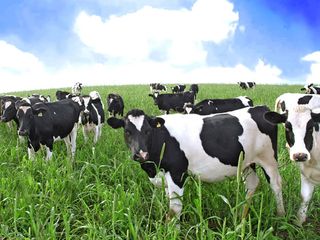Herb Quells Cows' Methane-Laden Belches

For scientists concerned about greenhouse gas emissions, cow farts are nowhere near as problematic as their methane-laden belches. Now a new oregano supplement could stem the burps and reduce the potent methane emissions.
Worldwide, cows are responsible for 37 percent of the human-produced methane, according to study researcher Alexander Hristov, an associate professor of dairy nutrition at Penn State University. Most of that methane comes not from the backsides of cows, but from the gas they belch after digesting their food, according to Hristov and the Food and Agriculture Organization of the United Nations. [Read "Marshes Pass Too Much Gas"]
"The cow 'farts' very little methane," Hristov told LiveScience. "The vast majority of methane is produced in the rumen and is belched out."
Methanogenic bacteria in the rumen, the largest compartment of the four-chambered stomach, break down the material into nutrients. Two of the byproducts are carbon dioxide and methane.
After screening hundreds of essential oils, plants and various compounds in the lab, Hristov found that oregano consistently reduced methane without showing any negative effects.
Tests on lactating cows at Penn State's dairy barns showed the supplement decreased methane emissions by 40 percent.
"Less methane produced means less methane in the belches and probably fewer belches, because methane can make up to 30-40 percent of the rumen gas," Hristov said.
Sign up for the Live Science daily newsletter now
Get the world’s most fascinating discoveries delivered straight to your inbox.
The supplement also increased daily milk production by nearly 3 pounds (1.4 kilograms) of milk for each cow during the trials.
"Since methane production is an energy loss for the animal, this isn't really a surprise," Hristov said. "If you decrease energy loss, the cows can use that energy for other processes, such as making milk."
Follow-up trials should firm up the supplement's methane-curbing abilities. Then, Hristov hopes to identify the active ingredients in the supplement in order to produce purer products.
The work will be presented at the 4th International Greenhouse Gases and Animal Agriculture (GGAA) Conference in October in Banff, Canada. Results will also be published in a forthcoming special issue of the journal Animal Feed Science and Technology.
Jeanna Bryner is managing editor of Scientific American. Previously she was editor in chief of Live Science and, prior to that, an editor at Scholastic's Science World magazine. Bryner has an English degree from Salisbury University, a master's degree in biogeochemistry and environmental sciences from the University of Maryland and a graduate science journalism degree from New York University. She has worked as a biologist in Florida, where she monitored wetlands and did field surveys for endangered species, including the gorgeous Florida Scrub Jay. She also received an ocean sciences journalism fellowship from the Woods Hole Oceanographic Institution. She is a firm believer that science is for everyone and that just about everything can be viewed through the lens of science.
Most Popular

